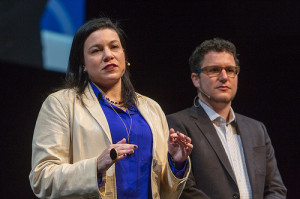 The Lean Startup brings an incredible array of stories and voices to the stage every year — why shouldn’t yours be one of them?
The Lean Startup brings an incredible array of stories and voices to the stage every year — why shouldn’t yours be one of them?
Today I am interviewing Sarah Milstein with The Lean Startup to bust the top three myths you may be telling yourself about why you can’t submit — take a read below and get your submission in before the deadline on Thursday!
Myth #1: I need to have a success story to share.
Actually, one of the biggest reasons we reject proposals is because they’re cheerleading for Lean Startup (i.e., “We started using MVPs, and it’s been great!”). That kind of story is good for convincing people to try Lean Startup, but that’s not our goal. Instead, we’re trying to help people implement the methods–and other entrepreneurs can’t learn from a story that’s all success. So we’re interested in how you’ve applied Lean Startup and what *really* happened. How you didn’t understand the importance of a hypothesis in an MVP, so your experiments didn’t lead you forward. Or how your designers were on board with daily iterations, but not your developers. Etc. In other words, we want to hear about the roadblocks you’ve faced–and then how you’ve overcome them.
Myth #2: I need to be an entrepreneur.
We define a startup as a new initiative that faces extreme uncertainty–usually in the product, the customer and/or the business model. Looked at that way, startups include not just two people in a garage in Silicon Valley, but also R&D groups in Fortune 1000s, new products in established companies, services in government and NGOs, etc. In other words, when we say we’re looking for “entrepreneurs,” we mean the people responsible for those initiatives, in any kind of organization. Entrepreneurs are everywhere. If you’re reading this, you’re likely an entrepreneur.
Myth #3: I need to have a lot of public speaking under my belt.
Our job as conference hosts is not to put on stage a bunch of people everyone can hear elsewhere. It’s to find people with relevant experience and advice to share that *our attendees couldn’t readily find themselves.* What we–and our audience–care about is your business experience, not your speaking experience. So we welcome–in fact, often prefer–people who are new speakers. We can, and do, provide speaker training, along with hands-on help developing your talk so that you’re able to communicate confidently and clearly. Speaking skills are something you can learn; business experience is the piece you bring that’s unique.
Planing to submit? Hit the comments and let us know!
You can also connect with Sarah on Twitter at @SarahM.
